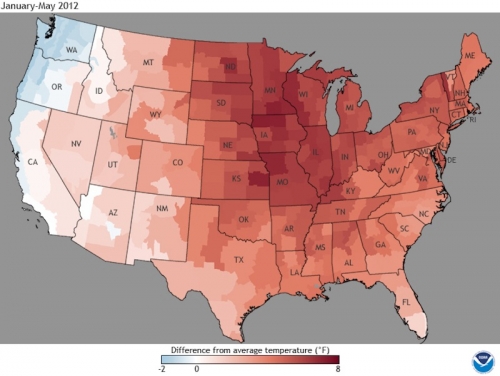Verdict is In: Climate is Changing — Beyond Weather Variability
March through May — the Spring months — witnessed the breaking of temperature records all across the US.
Weather experts are calling it the "Summer in March." 35 Heat records were broken for every record breaking Cold statistic.
The observation about the importance of this pattern comes not only from NOAA, the US Government agency that includes the National Weather Service, but is joined by unambiguous statements from the Weather Channel, and Weather Underground, private companies, that have not always chimed in about climate change. Here is what their experts are saying:
- Christopher C. Burt, the weather historian at Wunderground, another professional weather source said, “it’s almost like science fiction at this point.“
- Dr. Jeff Masters of the Weather Channel: "A spring heat wave like no other in U.S. and Canadian history peaked in intensity yesterday, during its tenth day. Since record keeping began in the late 1800s, there have never been so many temperature records broken for spring warmth in a one-week period–and the margins by which some of the records were broken yesterday were truly astonishing."
- Weather Channel meteorologist Stu Ostro calls the current heat wave “surreal” and explained that “While natural factors are contributing to this warm spell, given the nature of it and its context with other extreme weather events and patterns in recent years there is a high probability that global warming is having an influence upon its extremity.”
- Meteorologist Masters published a detailed statistical analysis that concluded, “It is highly unlikely the warmth of the current ‘Summer in March’ heat wave could have occurred unless the climate was warming.”
This off-the-charts event is just what scientists have been warning to expect if we kept spewing billions of tons of heat-trapping greenhouse gases into the air (see Hansen et al: “Extreme Heat Waves … in Texas and Oklahoma in 2011 and Moscow in 2010 Were ‘Caused’ by GlobalWarming”).
On Thursday Climae Central's Andrew Freedman published:
Four Major Heat Records Fall in Stunning NOAA Report
Four major heat records fell in a stunning new climate report from the National Oceanic and Atmospheric Administration (NOAA) on Thursday. The lower 48 states set temperature records for the warmest spring, largest seasonal departure from average, warmest year-to-date, and warmest 12-month period, all new marks since records began in 1895. While the globe has been tracking slightly cooler than recent years — thanks in part to the influence of now dissipated La Nina conditions in the tropical Pacific — the U.S. has been sizzling.
The average springtime temperature in the lower 48 was so far above the 1901-2000 average — 5.2°F, to be exact — that the country set a record for the largest temperature departure for any season on record since 1895.
For a more complete commentary see Freedman's full commentary at http://www.climatecentral.org/news/warmest-spring-year-and-12-month-period-in-us/

